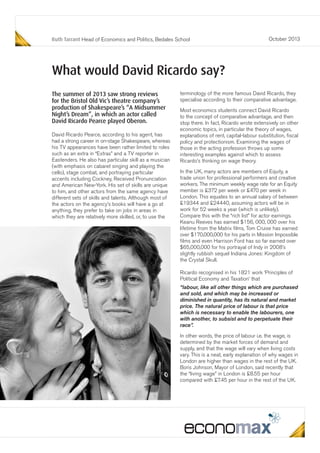
econoMAX - What would David Ricardo say?
- 1. Ruth Tarrant Head of Economics and Politics, Bedales School October 2013 What would David Ricardo say? The summer of 2013 saw strong reviews for the Bristol Old Vic’s theatre company’s production of Shakespeare’s “A Midsummer Night’s Dream”, in which an actor called David Ricardo Pearce played Oberon. David Ricardo Pearce, according to his agent, has had a strong career in on-stage Shakespeare, whereas his TV appearances have been rather limited to roles such as an extra in “Extras” and a TV reporter in Eastenders. He also has particular skill as a musician (with emphasis on cabaret singing and playing the cello), stage combat, and portraying particular accents including Cockney, Received Pronunciation and American New-York. His set of skills are unique to him, and other actors from the same agency have different sets of skills and talents. Although most of the actors on the agency’s books will have a go at anything, they prefer to take on jobs in areas in which they are relatively more skilled, or, to use the terminology of the more famous David Ricardo, they specialise according to their comparative advantage. Most economics students connect David Ricardo to the concept of comparative advantage, and then stop there. In fact, Ricardo wrote extensively on other economic topics, in particular the theory of wages, explanations of rent, capital-labour substitution, fiscal policy and protectionism. Examining the wages of those in the acting profession throws up some interesting examples against which to assess Ricardo’s thinking on wage theory. In the UK, many actors are members of Equity, a trade union for professional performers and creative workers. The minimum weekly wage rate for an Equity member is £372 per week or £470 per week in London. This equates to an annual salary of between £19344 and £24440, assuming actors will be in work for 52 weeks a year (which is unlikely). Compare this with the “rich list” for actor earnings. Keanu Reeves has earned $156, 000, 000 over his lifetime from the Matrix films, Tom Cruise has earned over $170,000,000 for his parts in Mission Impossible films and even Harrison Ford has so far earned over $65,000,000 for his portrayal of Indy in 2008’s slightly rubbish sequel Indiana Jones: Kingdom of the Crystal Skull. Ricardo recognised in his 1821 work ‘Principles of Political Economy and Taxation’ that “labour, like all other things which are purchased and sold, and which may be increased or diminished in quantity, has its natural and market price. The natural price of labour is that price which is necessary to enable the labourers, one with another, to subsist and to perpetuate their race”. In other words, the price of labour i.e. the wage, is determined by the market forces of demand and supply, and that the wage will vary when living costs vary. This is a neat, early explanation of why wages in London are higher than wages in the rest of the UK. Boris Johnson, Mayor of London, said recently that the “living wage” in London is £8.55 per hour compared with £7.45 per hour in the rest of the UK.
- 2. Ruth Tarrant Head of Economics and Politics, Bedales School Whilst Ricardo’s explanation can help us to understand the difference in wages for actors in and out of London, does his work give us any insight into why some Hollywood A-Listers can command enormous wages? Ricardo seems to suggest throughout his work that the ‘market wage’ will, over time conform to what he calls the ‘natural wage’ (a good parallel to use in terms of understanding this is to think about the actual rate of unemployment compared with the natural rate of unemployment – the actual rate does not have to be equal to the natural rate, but over time it averages out). Ricardo wrote: Notwithstanding the tendency of wages to conform to their natural rate, their market rate, in an improving society, for an indefinite period, be constantly above it; for no sooner may the impulse, which an increase in capital give to a new demand for labour be obeyed, then another increase in capital may produce the same effect. Ricardo’s writing is not always particularly easy to understand, but what he seems to suggest here is that wages can be higher than expected if the industry and its capital is changing and evolving. The film and movie industry has certainly changed significantly since its inception over a century ago, most recently with digital media, and if you can believe it, new technology that can change the ending of a film depending on the mood of the viewers! However, the traditional place for actors, on stage, has changed very little over the last few hundred years. So, Ricardo suggests, markets wages are at their ‘natural rate’. This may be of some comfort to David Ricardo Pearce as he searches for his next job now that “A Midsummer Night’s Dream” has ended its run.
